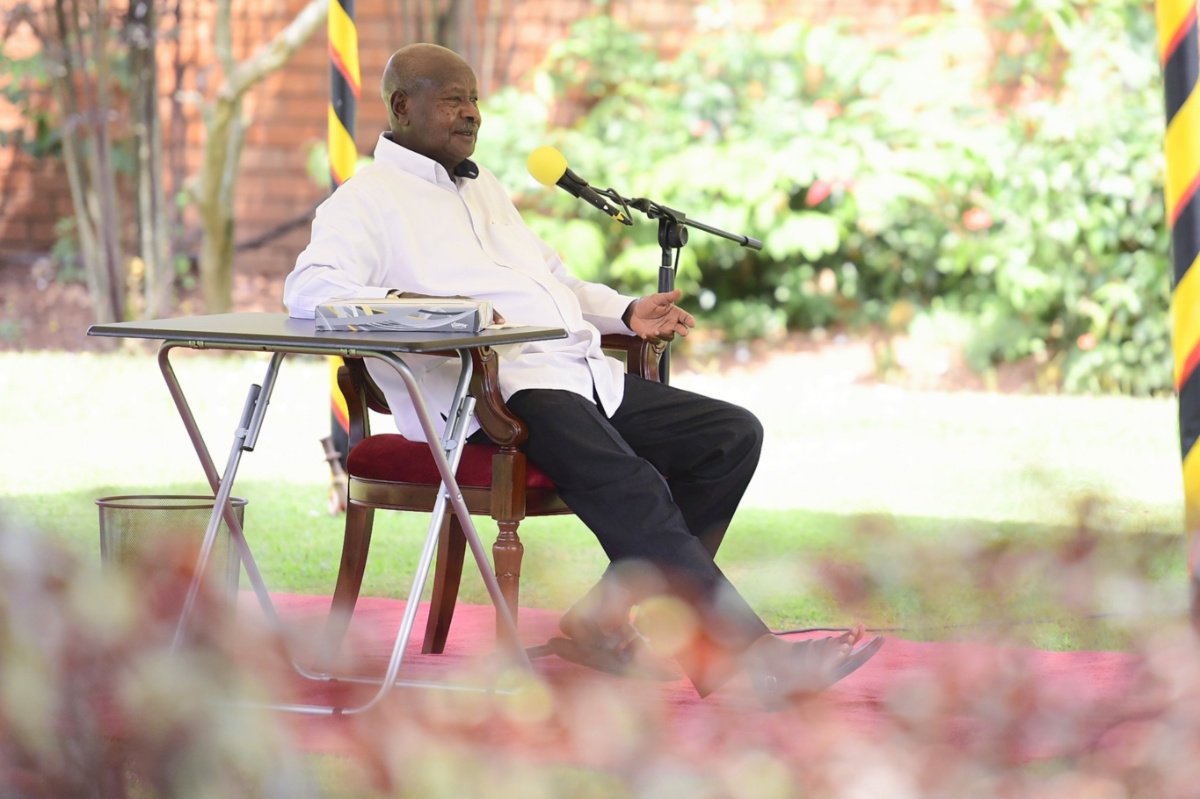Kampala, Uganda
A decision by President Yoweri Museveni to lift the ban on the activities of the Democratic Governance Facility – the main Western donor fund supporting dozens of charities and religious NGOs in the country – has stirred mixed reactions from the clergy and other stakeholders.

President Yoweri Museveni speaking to a Danish delegation at Nakasero State House, Kampala, on Wednesday, 22nd June. PICTURE: Presidential Press Unit.
President Museveni suspended the activities of the $US133 million Western donor fund in January, 2021. In a letter dated 22nd January, 2021, Museveni said the facility had been irregularly and unilaterally licensed by Uganda’s Ministry of Finance to be operated exclusively by a foreign mission without consultation and with limited involvement of Ugandans who are key stakeholders.
He further said that the foreign mission and its co-funders were given free reign to choose which activity, entities and amounts to finance without the knowledge and consent of his government.
“Indeed, a big percentage of these funds under DGF were used to finance activities and organizations designed to subvert government under the guise of improving governance,” Museveni said in the letter.
He released the letter at the peak of the 2021 presidential elections when he was facing the stiffest challenge from his youthful challenger Robert Kyagulanyi (alias Bobi Wine) of the National Unity Platform. Museveni’s government had accused some of the organisations funded by DGF of working with Kyagulanyi’s camp with the aim of causing regime change in Uganda.
Museveni suspended the activities of DGF until his cabinet had fully reviewed the matter and after a new leadership structure with “adequate local representation” had been agreed upon. He also ordered the police and Inspectorate of Government to investigate DGF activities and report to cabinet. The suspension of DGF reportedly left churches and their affiliated NGOs as well as civil society organisations supported by DGF on “life support”.
Church-affiliated NGOs that were directly affected by the ban included Teso Religious Leaders Efforts for Peace & Reconciliation; Rwenzori Forum for Peace and Justice; and the Ecology Christian Organization. They had been funded by DGF to promote social justice in their respective communities.
While religious and civil society leaders and donors had urged President Museveni to lift the ban on DGF, it wasn’t until last Wednesday that he declared that the ban on DGF would be lifted as long as his government is represented in the decision making structures of DGF.
Museveni made the remarks while meeting a delegation of investors from Denmark – led by Danish Minister for Development Cooperation, Flemming Miller Mortensen, and Danish mbassador to Uganda, Nicolaj Abraham Petersen – at State House Nakasero in Kampala. During the meeting, Mortensen had appealed to Museveni to lift the ban on DGF activities.
The DGF was initially established in Uganda in July, 2011, by eight development partners as a five-year governance program aimed at providing harmonised, coherent and well-coordinated support to state and non-state entities to strengthen democratisation, protect human rights, improve access to justice and enhance accountability in Uganda. Countries that supported the DGF include Austria, Denmark, Ireland, the Netherlands, Norway, Sweden and the European Union.
We rely on our readers to fund Sight's work - become a financial supporter today!
For more information, head to our Subscriber's page.
News of President Museveni’s decision to lift the ban on DGF activities has received mixed reactions from the clergy and other stakeholders with some commending and others criticising him.
Rev Dr Grace Lubaale, a lecturer at Kyambogo University in Uganda, told Sight that the President’s decision was not worth celebrating since he didn’t follow the law when he was suspending the facility’s activities and even in deciding to lift the ban.
“Which law did President Museveni use to close DGF? Did he go through the NGO Council as mandated by the law? He has manhandled the issue,” Dr Lubaale said. “Let systems be given a chance to work at least once in Uganda.”
But Pastor Solomon Male, executive director of Arising for Christ Ministries, welcomed the move to lift the ban , sayng that once the funds from DGF are released, they will be able to help Ugandans currently grappling with the issue of high commodities prices.
“The funds will have a trickledown effect to many Ugandans especially after salaries are paid to employees working for the NGOs funded by DGF,” Male said adding that the suspension of DGF affected the ordinary people and not President Museveni and his ministers.
Mariam Wangadya, chairperson of the Uganda Human Rights Commission, also welcomed the move to lift a ban, arguing that it will help to bridge the funding gaps in her department.
Wangadya noted that many of the commission’s activities, such as investigations of the human rights violations, inspection of police and prison cells and the monitoring of the government’s compliance with the international human rights standards had all stalled due to the ban on DGF activities.





